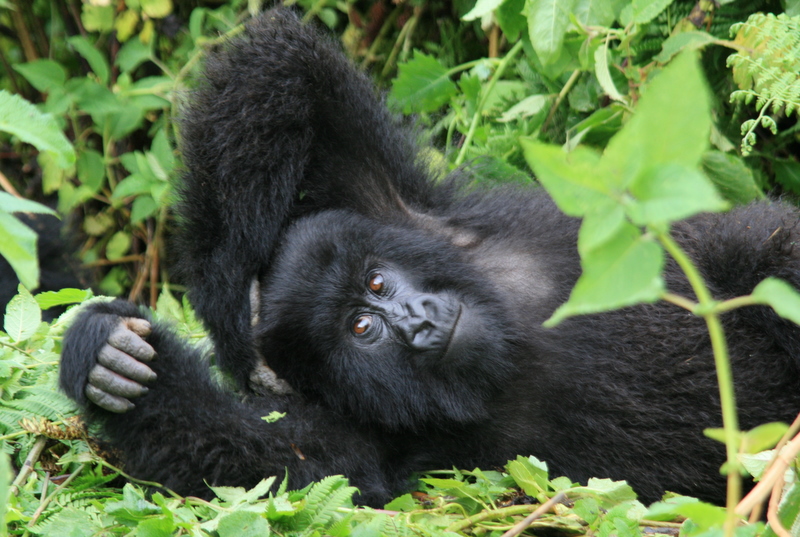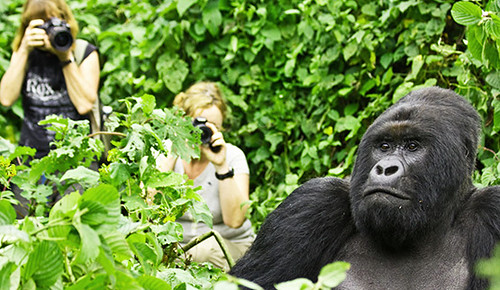How Many Gorillas Are Left in Africa? Gorillas are among Africa's most iconic and endangered…
Are Gorillas Safe to Humans?
Are Gorillas Safe to Humans? Debunking Myths About the Gentle Giants
Gorillas, often referred to as the “gentle giants” of the animal kingdom, are some of the most fascinating creatures on Earth. Despite their size and strength, they are generally peaceful animals that live in tight-knit family groups. However, their imposing appearance and strength often lead to misconceptions, prompting the question: Are gorillas safe to humans?
In this blog post, we’ll explore the true nature of gorillas, when they can pose risks, and how you can safely enjoy unforgettable encounters with these incredible primates.
Understanding Gorilla Behavior
Gorillas are naturally shy, peaceful creatures that rarely show aggression unless they feel threatened. Living in groups led by a dominant male, known as a silverback, their primary focus is maintaining harmony within their troop.
In the wild, gorillas spend their days foraging, grooming, and raising their young. They are herbivores, feeding on plants, fruits, and bamboo shoots, and are not predators or naturally aggressive toward other animals or humans. While they may display defensive behaviors such as chest-beating or roaring, these actions are typically warnings and not signs of immediate danger.
Are Gorillas Dangerous to Humans?
For the most part, gorillas are safe to humans, particularly habituated gorillas that have been exposed to human presence over time. In countries like Uganda, Rwanda, and the Democratic Republic of Congo, habituation programs prepare gorillas for eco-tourism by gradually familiarizing them with humans. These gorillas are accustomed to visitors and exhibit calm behavior during trekking experiences.![]()
However, wild gorillas that have not undergone habituation can be wary of humans and may exhibit defensive behaviors if they perceive a threat. Even in such cases, gorillas typically avoid confrontation and prefer to retreat. Encounters only become risky if humans act provocatively, such as by getting too close, making sudden movements, or showing aggression.
Safety Tips for Gorilla Trekking
Gorilla trekking, one of the most popular wildlife adventures in Africa, is safe when done responsibly. Here are some tips to ensure your safety and the well-being of the gorillas:
- Keep a Safe Distance, Stay at least 7 meters (23 feet) away from the gorillas to respect their space and minimize the risk of transmitting human illnesses.
- Follow the Guide’s Instructions, Experienced guides and rangers lead all treks and provide guidance on how to behave around gorillas.
- Avoid Direct Eye Contact, Staring directly at a gorilla can be interpreted as a challenge or threat. Instead, keep your gaze soft and indirect.
- Remain Calm and Quiet, Loud noises or sudden movements can startle gorillas, so maintain a calm and composed demeanor.
- Do Not Touch or Feed Gorillas, While they may seem friendly, gorillas are wild animals and should not be treated like pets.
By adhering to these guidelines, you can enjoy a safe, unforgettable encounter with gorillas while ensuring their safety as well.
Why Gorillas Are Not Aggressive by Nature
Gorillas prioritize social harmony within their groups and are known for their gentle, nurturing behavior. The silverback, despite its powerful build and leadership role, rarely acts aggressively unless provoked. This calm temperament makes gorillas one of the more approachable primates in the wild.
Their preference for avoiding conflict aligns with their herbivorous diet and non-predatory nature. Unlike big cats or other carnivorous animals, gorillas do not need to hunt or compete aggressively for food, further reinforcing their peaceful disposition.
When Do Gorillas Pose a Risk?
While gorillas are generally safe to humans, there are certain situations where their defensive instincts might come into play:
- Perceived Threat to Their Group, A silverback will act protectively if it perceives danger to its family group, especially young ones.
- Intrusion into Their Space, Approaching gorillas too closely or ignoring guidelines can cause discomfort and lead to defensive behaviors.
- Sudden Movements or Loud Noises, These can startle gorillas and trigger a response.
In most cases, these situations are avoidable by following trekking rules and respecting the animals’ boundaries.
Are Gorillas Safe to Humans?
Yes, gorillas are safe to humans when approached responsibly and with proper guidance. Their peaceful nature and the efforts of conservationists to habituate them for tourism make gorilla trekking an incredible and secure experience.
By respecting their space, understanding their behavior, and following expert advice, you can enjoy a magical encounter with these gentle giants in their natural habitat. Gorillas remind us of the beauty of coexistence between humans and wildlife, offering moments of awe and inspiration that leave lasting memories.
If you’re considering a gorilla trekking adventure, rest assured that it’s one of the safest and most rewarding wildlife experiences you can have.


